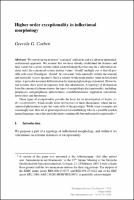Chapter Higher order exceptionality in inflectional morphology
Author(s)
Corbett, George
Contributor(s)
Wiese, Heike (editor)
Simon, Horst J. (editor)
Collection
European Research Council (ERC); EU collectionLanguage
EnglishAbstract
We start from the notion of ‘canonical’ inflection, and we adopt an inferential-realizational approach. We assume that we have already established the features and their values for a given system (while acknowledging that this may be a substantial analytic task). In a canonical system, feature values “should” multiply out so that all possible cells exist. Paradigms “should” be consistent, both internally (within the lexeme) and externally (across lexemes). Such a scheme would make perfect sense in functional terms: it provides maximal differentiation for minimal phonological material. However, real systems show great divergences from this idealization. A typology of divergences from the canonical scheme situates the types of morphological exceptionality, including: periphrasis, anti-periphrasis, defectiveness, overdifferentiation, suppletion, syncretism, heteroclisis and deponency. These types of exceptionality provide the basis for an investigation of higher order exceptionality, which results from interactions of these phenomena, where the exceptional phenomena target the same cells of the paradigm. While some examples are vanishingly rare, they are of great importance for establishing what is a possible word inhuman language, since they push the limits considerably beyond normal exceptionality.
Keywords
General LinguisticsDOI
10.1515/9783110219098.107ISBN
9783110219081OCN
1135848179Publisher
De GruyterPublisher website
https://www.degruyter.com/Publication date and place
Berlin/Boston, 2011Grantor
Classification
Linguistics
Philosophy of language


 Download
Download